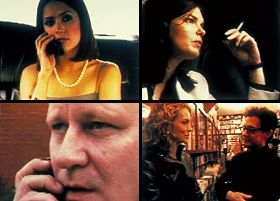Timecode

Four rooms: The viewer does the editing, watching all four cameras roll at once (clockwise from top left: Hayek, Tripplehorn, Burrows and MacLachlan, Skarsgard).
dir-scr Mike Figgis
with Jeanne Tripplehorn, Salma Hayek, Stellan Skarsgard, Saffron Burrows,
Holly Hunter, Julian Sands, Steven Weber, Kyle MacLaughlan,
Leslie Mann, Xander Berkeley, Glenne Headley, Danny Huston,
Richard Edson, Alessandro Nivola, Zuleikha Robinson, Mia Maestro
Screen Gems 00/US

Review by Rich Cline
Figgis continues his cinematic experimentation (his last two films were the two-character/one-set Stringberg adaptation Miss Julie and the offbeat film-mural The Loss of Sexual Innocence). And with Timecode he not only finds something utterly new, but it works as well! The screen is divided into quarters, each containing a single continuous take. All four shots were filmed at the same time, so as the characters intersect and cross from frame to frame, the story continues ... like watching four surveillance (handheld) cameras. And as Figgis orchestrates the carefully timed story, the actors improvise much of the action and dialog, creating an overall film that continually surprises.
The primary figure is the insanely jealous Lauren (Tripplehorn), who sits in her limousine spying on her girlfriend Rose (Hayek) as she goes to an audition at a small L.A. production office. But Rose is actually having a fling with drug-addled producer Alex (Skarsgard), whose wife Emma (Burrows) is tormented by the failure of her marriage. Meanwhile, Alex's company is facing problems as the team (Hunter, Weber, Berkeley, et al) gathers in the boardroom to consider their depressingly desperate options.
The plot itself is a bit muddled, some of the characters spring much more to life than others, and a few scenes are confusing. But using clever sound and musical clues, Figgis guides the viewer from frame to frame as the story unfolds. And you could probably watch the film 10 times and see something completely different each time. In this sense, this is groundbreaking cinema on several levels (one continuous take, real-time storytelling, four synchronised "sets", the use of digital video, and of course the multiple images). He allows the audience to do the editing--which is also beginning to happen with digital TV sports channels. And on top of all this, Figgis and his cast manage to tell an emotionally engaging story full of comedy, tragedy, romance and even suspense. Standouts include Hayek (in a surprisingly resonant performance), Tripplehorn (on screen virtually every second of the film), Hunter (who looks like a frightened rabbit as she sees her career slipping away) and Sands (as a comic relief masseur). It's the kind of film that makes you catch your breath with astonishment and delight ... over and over again.
[15--adult themes and situations, language, violence] 30.Jun.00
US release 28.Apr.00; UK release 18.Aug.00
~~~~~~~ ~~ ~~~ ~~~~
READER REVIEWS
"Figgis' DV feature is so technically groundbreaking (at least in mainstream cinema) in so many ways that it should be applauded for this even if it was woefully unwatchable. Shot on Digital Video with top-tier talent (Skarsgard, Hunter, Hayek, etc), Timecode has no edits whatsoever and the screen is divided into quadrants with one camera following the story in each. While the concept may suggest sensory overload, it really provides no more visual information than any number of snippets from Gladiator (and Figgis does a good job of keying you in by monkeying with the sound). What makes it even more impressive is how entertaining it is, despite its blaise plot (film execs who don't want to make films). It is helped to no end by the charming smallish parts, Edson and Sands in particular, and the fact that Figgis is having so much fun." --Ryan M, Los Angeles.

© 2000 by Rich Cline, Shadows
on the Wall
HOME | AWARDS
| READER REVIEWS | Q&A | ABOUT | TALKBACK


